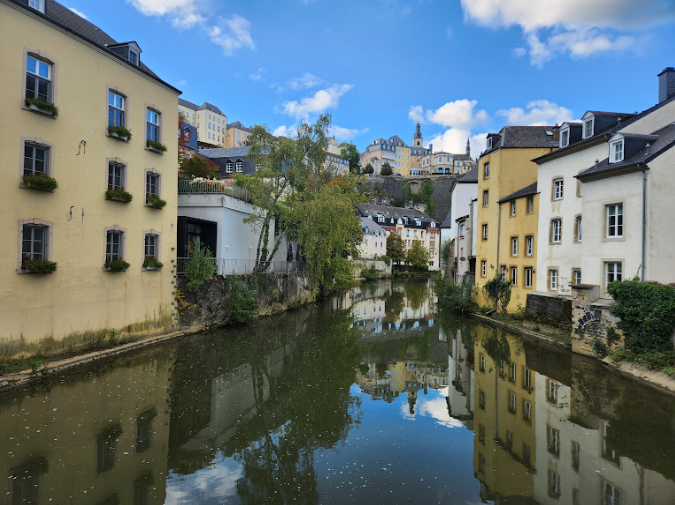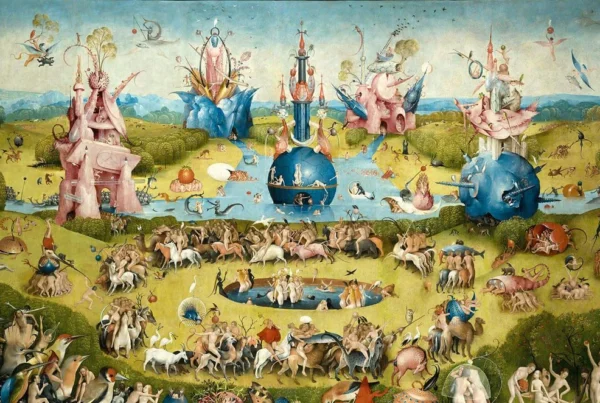Image Credit: Berkovich, Adrian. “View of the Alzette”. Oct 5, 2024.
Although Luxembourg recently saw a financial boom in the 1960s that made it so impenetrable, it was once a steel-driven economy considerably smaller than that of Germany. So an investigative team of Sciences Po students shares its inquiries with the Sundial Press in hopes of getting a microscopic look (since it is so small) at what is going on on the ground that cannot be explained by a map.
Luxembourg – merely an hour and a half on the TGV from Champagne-Ardenne lies a country on the periphery of the cultural (Paris), political (Brussels), and judicial (The Hague) capitals of Europe, not small enough to be considered a city-state, yet too crept away to be considered when Americans “do” a Western European country.
Given its location at the crossroads of Europe’s major powers, Luxembourg should seem like a pawn comparable to Alsace and Lorraine in France, yet it has managed to preserve its distinct identity over the centuries. Despite being a corner piece of Germany, France, and Belgium, the European Union triangle of political institutions that revolves around it unifies into the economic, diamond-shaped hub of commerce known as the ‘Gibraltar of the North’. Nevertheless, as its size might suggest, its topography does not vary considerably, yet it has survived centuries of war from the Middle Ages to the Age of Revolutions to the forefront of both World Wars, all while hosting a significant tax-haven-seeking expat population.
Luxembourg’s continued sovereignty was further solidified by the 1867 Treaty of London, which declared its neutrality, though this really meant that Luxembourg was fluid for invasion by other powers. Coincidentally, each time the country got invaded, the government would flee to London.
Its diplomatic feat is certainly substantial when considering that Sciences Po was created on the basis of the same wars that had Luxembourg right on the forefront. So how did Luxembourg, a nation located next to the world’s most invaded fronts, manage to fend for itself, even maintaining its native language, in the face of constant clash between France and Germany? Well, an investigative team at Sciences Po known as “Trip de Luxe”, not associated with the Sundial Press, headed to the tourist attractions (not just the bars) of the cliff-ridden, namesake capital city to find out. Surely, the secrets of the valley could be revealed before catching a 2AM Flixbus the next day.. The explanation behind the choice of location was theoretically scoped, and principally economic: by paying five euros to take the bus to Luxembourg for a distance double that of Paris for three times cheaper, it is as if the team were being paid to contribute to the research market.
As one of the members (who preferred to remain anonymous) claimed, “when strolling between the Grund — the lower, older section of Luxembourg City — and the Ville-Haute — the city on the cliff — it becomes clear why they built an elevator to connect the two neighborhoods”. The picturesque town, blending German and French architecture, is situated at the bend of a steep valley, and makes great use of that elevation.
Image Credit: Pavageau, Bruno. “From across the Valley”. Oct 5, 2024.
Luxembourg City is complete with both crested churches, folkloric neighborhoods, hillside restaurants, and, on the other side of the Alzette river, which is an utmost inefficient creek to traverse without bridges, is the magnificent European Investment Bank. Another investigator whose sights are set on the world of commerce remarked, “let’s just say it would be nice to do your Parcours Civique here” in response to the beautiful view of the skyward financial district. However, its rise to a favorable corporate environment only took place in the 1960s with a transition from a steel-driven economy to a global financial hub with an attractive tax structure.
The blend of luxury, as the prefix of the investigative team suggests, and social assistance becomes evident upon discovering that all public transport in the country is free. In fact, this should be apparent considering that “Luxembourg represents the melange between German efficiency and Paris restaurant prices”, with a strong commitment to progressive policies. Contrarily, in countries with low taxes, high prices are typically preceded by higher standards of living, but less subsidies. Bruno, the sole investigator to prefer not to remain anonymous, remarked that Luxembourg is perhaps “the only country where Papa John’s [the popular American pizza chain] serves pizza in skillets”.
“I think the best way to sum up the country’s continued sovereignty is to think about the random woodlands in the capital. One section of the park is laced with used horse tranquilizer needles scattered in the grass. Meanwhile, only a few meters away from clear historical landmarks like Fort Niedergrünewald you will find a tunnel with a massive trap floor board,” Luxembourg is full of surprises. “Maybe Karl Marx named the Bourgeois after this place” — he did not — “but in reality nobody saw Luxembourg’s full potential until the Portuguese.” They saw potential, the EU saw neutrality, and everyone else was shocked that “there is a direct train from the construction zone known as Reims to this articulately constructed capital. It is the embodiment of the ‘City on a Hill’, something that Salem, Massachusetts could never be.”
Considering that Luxembourg was never short of economic means, whether the economy was steel or bank driven, its sovereignty may not appear quite as surprising. However, at the same time, this is exactly what happened to Alsace and Lorraine. Perhaps the strive to discover Luxembourg is more a question of curiosity than to unveil a paradox—a reason to leave France. Regardless, no micronation is more publicly engaged (both nationally and internationally) and welcoming to expats, yet highly entrusted with an incredibly favorable tax-banking system (without having contributed to war crimes).
The subtle language medium between French and German, should be evidence enough that there is no country more involved, yet peripheral to the history of Europe than Luxembourg.
How much do you know about Luxembourg?
- Language spoken by 20% of the population with no geographical explanation.
- It is nicknamed “________ of the North” due to the capital’s fortress design.
- There are no ______ taxes in the registry.
- Luxembourg’s government fled here during World War II.
- US president honored throughout the country for his contribution to European integration.
- Luxembourg is the only country with this distinct form of monarchy.
- Luxembourg was part of this country for its own protection (1815-90).
Other posts that may interest you:
Discover more from The Sundial Press
Subscribe to get the latest posts sent to your email.




